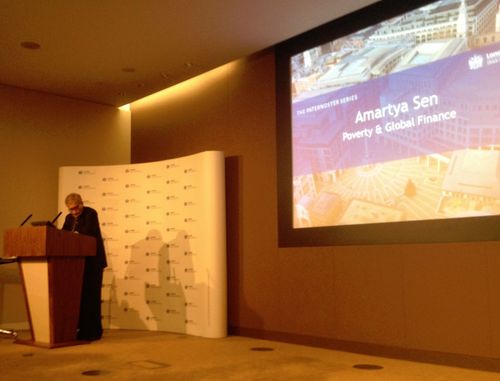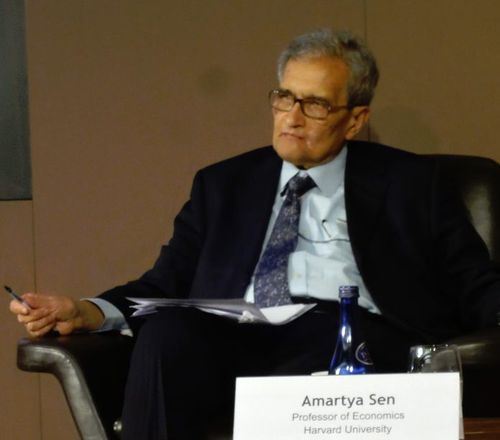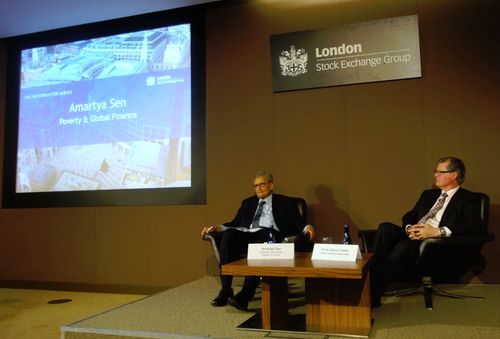
I attended an interesting lecture last night from an economic legend: Professor Amartya Sen of Harvard University.
If you haven’t heard of him, he’s known as the Mother Teresa of economics in his native India, and has spent a lifetime fighting poverty with analysis rather than activism.
Awarded the Nobel Prize in Economic Sciences in 1998, for his contributions to welfare economics and interest in the problems of society's poorest members, Sen is best known for his work on the causes of famine.
He is currently Professor of Economics and Philosophy at Harvard University, as well as being a senior fellow at the Harvard Society of Fellows, distinguished fellow of All Souls College, Oxford and a Fellow of Trinity College, Cambridge, where he previously served as Master from 1998 to 2004.
An impressive guy.
Amartya delivered his speech as part of the London Stock Exchange Group series of lectures on the future of global finance, and the evening was hosted by LSE Chairman, Chris Gibson-Smith.

Here’s a brief summary of Amartya’s sentiments (I say ‘sentiments’ as this is not a record of his speech and incorporates my own spin on his words).
Some people say we live in interesting times, but I think we live in baffling times.
We live in baffling, rather than interesting, times because it is very hard to get any clarity about the future.
The only thing that is certain is, in the words of George Bernard Shaw, “the greatest of evils and the worst of crimes is poverty”.
Shaw wrote this in the Preface to his brilliant play, Major Barbara, published in 1907.
The tragedy of poverty is, of course, obvious to all - whether in Latin America, or in Asia or Africa, or in Europe and the United States.
The calamity of deprivation and penury can hardly be missed by those who have bothered to think about the subject, no matter whether they are themselves poor or not.
Lives are battered, happiness stifled, creativity destroyed, freedoms eradicated by the misfortunes of poverty.
But Bernard Shaw was not talking, on this occasion, about the hardship of poverty, or the misfortune that goes with it.
He was commenting, in a rather unusual way, about the causation and consequences of poverty - that it is bred through evil and ends up being a crime.
If poverty is indeed an evil, not to mention “the greatest of evils” as Shaw puts it, then there must be some wickedness, or at least some culpability, behind poverty - some wrong-doing that allows such human tragedies to occur and persist.
This raises the immediate question: who, then, are the wrong-doers?
If you look to protesters today, such as the Occupy Wall Street movement, the wrongdoers are represented by the corporate greed of capitalists and the banks.
You can just as easily take the opposite view however, and look to the Tea Party movement who see the failure being that of government and government policies.
The Tea Party align with Adam Smith, the guru of capitalism, and believe that free markets should rule.
Who is right and who is wrong?
Or is this the right question?
In thinking about strategic issues, we cannot but go into the question of culpability and the failure of duties and obligations.
We have to ask: how can things be done differently so that the evil of poverty is ousted?

We have to identify the nature and genesis of the wrong-doing that is responsible for the affliction.
That is not, however, the same as trying to identify the wrong-doers?
The identification of wrong-doers is not our task and trying to identify the evil-doers is not the right strategy since the responsibility for creating an evil is very widely dispersed in the society.
We have to see how the actions - and indeed inactions - of a great many persons together lead to this evil, and how changing our modes of actions - our policies, our institutions, our priorities - can help to eliminate poverty.
Our focus definitely has to be on removing evil-doing, as part of our strategies and programs, rather than going on the wild-goose chase of catching the hugely dispersed collectivity of evil-doers, who may not even fully understand how their actions can be seen as part of an evil state of affairs.
In fact, we should eliminate the discussion of wrong doers completely, and focus our efforts more on how to stop poverty full stop.
This is why strategies such as closing sweatshop labour factories in poor countries, or arresting those who employ children in the making of carpets, would fail to eliminate the poverty of the victims if such action is separated from a general economic and social program.
In the vast majority of cases the employees are there in those terrible jobs because they have very few options - none that are particularly good.
This is because there has been a failure of the state and the society to create opportunities for decent employment, which makes it possible to recruit labour to do terrible jobs as the alternative may be unemployment and starvation.
That is why exploited labourers are led to soul-destroying work today in the poorer countries, and closing down sweated-labour factories without giving the victims alternative opportunities for employment or education - the latter is extremely important in the case of child labour - is not an adequate solution to the problems and predicaments of the precarious poor.
There is, of course, moral merit in restraining the pursuit of profit of businessmen through exploiting vulnerable and freedom-less labour, but a fuller solution can emerge only through positive opportunities of alternative employment and occupation, and that demands societal action.
So the first action to address poverty is to expand labour opportunities and assist in education, and not to just shutdown existing sources of income.

My argument so far has been based on seeing poverty as lowness of incomes.
Is employment with income a full solution to all problems of poverty?
To believe that would be to underestimate vastly the complexity of poverty, particularly the nature of persistent poverty.
By way of example, lowliness of income is the primary cause of starvation rather than the lowliness of the availability of food.
Is employment for income in order to buy food the answer to everything therefore?
No, as this misses the point of why there is persistent poverty
Strategic examination about eliminating poverty, or even reducing its burden, has to go more deeply into the nature of poverty.
Poverty is about the inability to lead a decent, minimally acceptable life, and while low income does make it difficult to lead a life of freedom and well-being, an exclusive concentration on seeing poverty as lowness of income misses out a great many important connections.
What are the other non-income factors that contribute to poverty: a lack of education, availability of work, investment in infrastructure and more, and capitalism addresses these issues by providing an insurance.
For example, all affluent societies have addressed extreme poverty issues through public policy programs, such as the public pension, the provision of school education, the availability of healthcare and more non-market non-commercial arranged facilities.
The economics of these areas are not obvious except that an insurance system run by the state or by some other social support system, not by profit-oriented private firms, may be a necessary part of the elimination of poverty.
Affluent societies focus upon profit maximisation and the unrestricted search for profit, but if they only relied on profit maximisation they would not function.
As a result, they balance between market mechanisms and state activities.
There is no strategic formula as to the correct balance between market mechanisms and state activities – the contrast between China and Taiwan or America and Sweden are good examples of how approaches differ – but we need to understand these balances in order to create a better world that addresses poverty with finance.
Does this mean arguing against Adam Smith’s principles for free markets?
Not really.
That view is a result of a huge misunderstanding of Adam Smith’s principles, and my position is strongly influenced by his.
Adam Smith clarified how markets work and how they can work exceedingly well. He believes that you need a well-functioning market economy and clarity of why you want such efficient markets to be.
The task of politicians in managing the economy is then to search for two distinct objectives: first, to provide plentiful revenue to cover the basic subsistence needs of the people before the subsistence needs of the state; and second, to provide the state with enough revenue to finance public services.
The financial focus of public services is a critical part of Smith’s work and Adam Smith had an overwhelmingly clear view about support of the poor and undersupported in his market view.
Within his free market principles, he clearly defended the role of the state to fund public services, such as education and poverty relief.
Adam Smith was deeply concerned about the inequality of society and never used the word capitalism.
The word capitalism does not appear in any of his books or any other writing, and it would be hard to carve out anything in his works on market economies that were based purely upon capital.
For example, he specifically argued about protections from unlimited usury practices.
So how should we think about the wrongdoers that need rectification, and how should we address poverty?
According to Adam Smith and my own thinking, the key is increasing employment.
Increasing employment must remain a worldwide priority and China, Brazil and India are doing much better at this than America and Europe.
As employment and economic welfare rises, the state must use such employment to improve public services for good living and public welfare and, in this respect, India is not doing this as well as China and Brazil.
Finally, for the West in general and Europe in particular, the crisis of 2008 was created by the malfunctioning of market economies – the result was the state had to create support for their economies and this is the reason for rising sovereign debt.
But the cause of this malfunctioning is clearly what was thought of as lack of accountability of governments, but governments are accountable and this is what we are seeing today.
What we are seeing is that, in order to pay back their debts, governments have far more accountability. However, they are addressing this accountability in the wrong way.
It’s hard to see how massive austerity drives, which cuts demand and growth, can therefore be supported,
Just look at Japan and learn from what happened there over the last 20 years of austerity, which is still biting.
What these governments need is fast economic growth.
Economic growth creates resources to address unemployment and poverty.
This is the key to addressing issues in Europe and the West, and it is the indiscipline of governments that has failed the markets, not the markets themselves.
Europe needs a better form of economic accountability and management of their economies, rather than austerities which decimate human lives and economic growth.
In conclusion, I end by affirming that George Bernard Shaw was right, a hundred years ago today, to point to the connection between poverty and evil and crime. The fact that this insight came not from an economist but from a dramatist and literary giant fits in well with my general thesis that the economics of poverty involves much more than just economics. Human lives in society are interlinked through economic, social, political and cultural associations. The nature, causes and consequences of poverty reflect the richness of those connections. We have no reason to be surprised by that elementary understanding.
Amartya then took Q&A from the floor and was asked a few interesting questions.

Q: You appear to be saying that in this current crisis, it is the failure of states to regulate markets effectively that failed, rather than the markets themselves. Is this your view?
You cannot separate markets and state, and this crisis was a failure of both, but you also have to be aware of the relationship between free markets and state influence.
For example, Adam Smith argued against usury, but was convinced to change his thoughts on interest after reading the works of Jeremy Bentham.
The core of how markets and state should work is that free markets is the most efficient model of economic management, but free markets need states that set efficient regulations to avoid failure in order to be truly workable.
As this shows, free markets and the state are two separate entities that are interdependent.
A key question in the last crisis however is whether globalisation killed that interdependency to cause the spiral of crisis we see today.
Globalisation may have undermined national states, as government can no longer effectively regulate the free markets?
There may be some truth in this statement, and this is why the G20, G8 and other global activities – the World Bank and IMF included – are key to solving these issues this time around.
Q: Do you think the euro will survive?
No.
When the euro was created, I didn’t see why it was needed and didn’t believe it made sense. I am a fan of Europe, don’t get me wrong there as my late wife was Italian, but to start a European integration without a fiscal foundation meant that it was never going to work.
You can see this today as many parts of the EU are not served well by a Europe that has no fiscal union. Greece is a good example.
Now however the loss of a country would be very destabilising for this European Union.
This is why Germany is being forced to bailout Europe.
Could they retreat out of it? Yes.
Is that the right thing to do? I think so.
Postnote: some of Amartya’s speech is taken from a write up of an earlier presentation he made in 2007. These words of wisdom are integrated in parts of this article to ensure more accuracy of content.
Chris M Skinner
Chris Skinner is best known as an independent commentator on the financial markets through his blog, TheFinanser.com, as author of the bestselling book Digital Bank, and Chair of the European networking forum the Financial Services Club. He has been voted one of the most influential people in banking by The Financial Brand (as well as one of the best blogs), a FinTech Titan (Next Bank), one of the Fintech Leaders you need to follow (City AM, Deluxe and Jax Finance), as well as one of the Top 40 most influential people in financial technology by the Wall Street Journal's Financial News. To learn more click here...






















